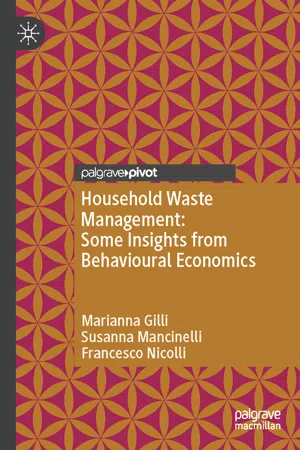In addition to climate change mitigation, waste management and disposal are among the main issues in policymakers ’ environmental agendas. The European Union , for example, has issued various directives intended to promote the use of alternative disposal methodologies. The most important step in that transition has been the waste framework directive (2008/98/EC), which presents a political and conceptual framework that should guide the evolution of European waste management towards a ‘recycling society ’. A milestone of that first approach was the consolidation of the so-called waste hierarchy, i.e. a ranking of waste management choices, in which landfills are considered to be the worst possible option, and prevention is the preferred option. A second step in this long path is the promulgation of the circular economy package, which poses the basis for a new definition of the European Economic System. In a few words, by circular economy, the European Parliament means a new concept of economy in which production is a circular flow that is based on a solid combination of reuse , repair, refurbishing and recycling, with the final aim of turning waste into resources. A similar approach has also been taken by Japan, which has recently stressed the need to promote a transition towards a Sound Material-Cycle Society,1 a new concept of an economic system based on waste minimization , recycling and resource reuse , and by the US, which has recently highlighted the key role of waste prevention and recycling as cornerstones of the country ’s waste management strategy.2
The success of these new and ambitious political approaches, which focus on waste reduction , separate collection , reuse and recycling, heavily depends on the contributions of citizens and households . This means, in other terms, that studying and understanding waste-related behaviours is becoming increasingly relevant. Actually, a relevant strand of economic literature has widely investigated how individuals’ reduction and recycling decisions respond to waste policies and to the diverse incentive devices. In this context an always increasing attention is drawn on individual motivations at the basis of waste management , with the purpose of considering the role of both monetary and non-monetary incentives towards a pro-environmental behaviour .
Individual behaviour in waste management is the focus of the book. Our aim is to offer insights about the main determinants of individual attitudes towards waste reduction and recycling, relying on some of the main contributions of the economic literature on the topic. Moreover, we offer two original empirical investigations that intend to deeply verify the role of different relevant determinants on individuals’ waste-related behaviours, and also their possible interactions .
To the pursuit of our goal, the book is organized into four chapters. Chapter 2 is devoted to the analysis of individuals’ intrinsic and extrinsic motivations behind pro-social behaviours , focusing particularly on the waste management context. Drivers different from the pecuniary ones are considered to incentivize people to undertake waste reduction and recycling. The possible interrelationships between the two waste management behaviours are investigated and some field experiment studies have been reported that contribute to a better understanding of the motivations that lead people to adopt pro-social behaviour in the waste realm. Chapter 3 complements the first one in that it aims at investigating waste policies that may affect individuals’ behaviour towards waste minimization and recycling. Both market base mechanisms, as unit-based pricing for unsorted waste , and technical policies , as adoption of curbside or drop-off systems are considered. The strength and weakness of each mechanism as drivers of people’s waste-related behaviours are highlighted. Chapter 4 offers an empirical investigation of individual motivations behind waste reduction and recycling. More specifically, it aims at verifying if one type of motivation (intrinsic and extrinsic) is more correlated with one of the two behaviours (minimization and recycling) or the other. Using Eurobarometer data, we note that extrinsic motivation has a higher effect on recycling habits than on minimization behaviour whilst the reverse is true for intrinsic motivation . Moreover, intrinsic motivation plays a role for the recycling of particular kinds of waste such as hazardous waste . Chapter 5, finally, considers both motivations and waste policies as determinants of people’s waste-related behaviour, with a specific focus on recycling. It analyses how waste collection policies can incentivize household recycling behaviours and whether individual motivations are capable of crowding-in policy efficacies, especially when the efforts required by agents are high. We exploit a new survey of 618 Italian families that reports information on the opinions and stated actual recycling behaviours of the respondents with respect to five different waste materials .
We do believe this work is valuable for several reasons. From an academic perspective, it enriches the still rather scarce literature on the determinants of waste behaviours and of the efficacies of waste policies with two original contributions, one at European level, and another one for a big European Country : Italy . From a policymaker perspective, we believe it provides some important suggestions. Firstly, it shows as individual motivations , both intrinsic and extrinsic, are positively correlated (to a different extent) to minimization and recycling performances. Moreover, indivi...
